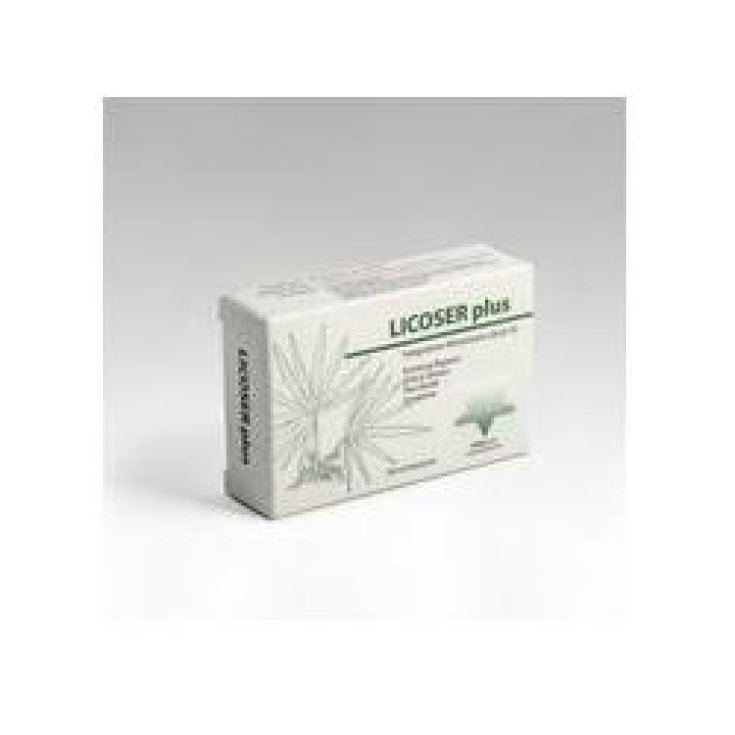Licoser Plus 30cpr
30.00€
30.93€

- Brand: BREA Srl
- Product Code: 923815649
- EAN:
- Availability: In Stock
- Purchase 3 items for 29.40€ each
- Purchase 4 items for 28.80€ each
- Purchase 5 items for 28.20€ each
LICOSER plus
Food supplement based on serenoa repens, lycopene, camellia sinensis, urticadioica; adjuvant to the maintenance of the physiological properties of the prostatic gland.It does not contain gluten or sugars.
Serenoa Repens (synonym of Sabal Serrulata)
Plant widespread in the United States, Southern Europe and North Africa. The most important chemical constituents are different sterols, free fatty acids, carotenoids, essential oils and polysaccharides.
Useful for the proper functioning of the urinary tract and the prostate.
Lycopene
Natural pigment belonging to the class of carotenoids, it is characterized by antioxidant properties similar to those of beta-carotene, but it is much more powerful, therefore much more effective in preventing the damage of oxygen free radicals. In nature, Lycopene is present in tomatoes and other vegetable substances; endowed with high antioxidant activity, it is considered among the carotenoids the most powerful "scavanger" (scavenger) of free oxygen radicals.
Urtica Dioica
Perennial herbaceous plant, native to western Asia, widespread in all temperate regions, including Italy. In modern phytotherapy the root plays a leading role, in fact it is rich in phytosterols (α-sitosterol, daucosterol and its glucosides), with a mechanism of action similar to those of Serenoa but also contains lectins (scopoletin) which inhibit EGF (Epidermal Grow Factor) a cell growth factor capable of reducing symptoms and partially also the volume of the gland. Therefore the Urtica Dioica root extract is particularly beneficial for limiting the growth of prostate tissue induced by androgens and in particular by dihydrotestosterone.
Green tea
It is obtained from the buds of the leaves and from the young leaves of the plant known by the scientific name of "Camelia sinensis". The peculiarity of this plant is its high antioxidant potential.
Ingrediants
| for 1 tablet (1300 mg) | |
| Serenoa Repens (dry extract 45% fatty acids) | |
| Urtica dioica dry extract (Radix) | |
| Green tea (Catechins) | |
| Lycopene | 10 mg |
How to use
We recommend taking 1 tablet a day to be taken before meals for a period of not less than 3/4 months.
Warnings
Do not exceed the recommended daily dose. Keep out of the reach of children under 3 years of age. Supplements are not intended as a substitute for a varied diet. For pregnant or lactating women and children it is recommended to seek medical advice.
Format
Pack of 30 tablets of 1300 mg.
Cod. 1010020.
Bibliography
- Carilla E, Briley M, Fauran F, Sultan C, Duvilliers C. Binding ofPermixon, a new treatment for prostatic benign hyperplasia, to the cytosolic androgenreceptor in the rat prostate. J Steroid Biochem 1984; 20: 521-3.
- Champault G, Patel JC, Bonnard QAM. A double-blind trial of anextract of the plant Serenoa repens in benign prostatic hyperplasia.Br J Clin Pharmacol1984; 18: 461-2.
- De Bruyne F. et al. Evaluation of the clinical benefit SerenoaRepens and Tamsulosin in severe BPH patients-Personal study subset analysis.Eur.Urol. 2004 Jun; 45 (6): 773-9; Discussion 779-80,2004.
- Boyle P, Robertson C, lowe F, Roehrborn C. Meta-analysis of clinical trials of Permixon in the treatment of symptomatic benign prostatichyperplasia. Urology 2000; 55: 533-9.
- Bent S. et al. Saw Palmetto for benign prostatic hyperplasya.N.Engl.J. Med. 354 (6): 557-66.2006.
- Wilt T, Ishani A, Stark G, Mac donald R, Mulrow C, Lau J. Serenoarepens for benign prostatic hyperplasia.Cochrane Database Syst Rev 2000; 2: CD001423.
- Fong YK, Milani S, Djavan B, Role of phytotherapy in men withlower urinary tract symptoms. Curr opin urol. 2005; 15 (1); 45-48.
- Wilt T, Ishani A, Mac Donald R, Serenoa repens for benign prostatichyperplasia. Cochrane Database Syst Rev, 2002; 3; CDCD001423.
- Strauch G, Perles P, Vergult G, et al. Comparison offinasteride and Serenoa repens in the inhibition of 5-alpha reductase in healthy malevolunteers. Eur.Urology 1994; 26: 3, 247-252.
- Debruyne F, Boyle P, Calais da Silva F, Gillenwater JG, HamdyFC, Perrin P, Teillac P, Vela- Navarrete R, Raynaud JP, Schulman C, Evalutation of theclinical benefit of permixon and tamsulosin in severe BPH patiens- PERMAL study subsetanalysis . Prog Urol, 2004 Jun; 14 (3): 326-331.
- Avins AL et al. A detailed safety assestment of a SawPalmetto extract. Complement ther med. 16 (3): 147-154,2008.
- Levy J., Bosin E. Et al., Lycopene is a more potent inhibitor ofhuman cancer cell proliferation than either a-carotene or b-carotene. Nutr.Cancer, 1995; 24: 257-266.
- Sökeland J. Combined sabal and urtica extract comparedwith finasteride in men with benign prostatic hyperplasia: analysis of prostate volume andtherapeutic outcome. BJU int 200; 86 (4): 439-442.
- Schneider T, Rubben H, Stinging nettle root extract in longterm treatment of benign prostatic syndrome (BPS). Results of a randomized, double-blind, placebo controlled multicenter study after 12 months. Urologe A, 2004; 43 (3): 302-306.
- Lichius JJ, The inhibiting effects of components of stingingnettle roots on experimentally induced prostatic i hyperplasia in mice. PlantaMed, 1999; 65.7: 666-668.
- Bombardelli E, Morazzoni P, Urtica Dioica L. Phytotherapy 1997; 68.5, 387-402.
- Chem Pharm, Bulletin 38-1990.
- Kurahashi N, Inoue M, Iwasaki M, Sasazuki S, Tsugane AS, JapanPublic Health Center- Based Prospective Study Group. Dairy product, satured fatty acid, and calcium intake and prostate cancer in a prospective cohort of Japanese men. CancerEpidemiol Biomarkers Prev, 2008 Apr; 17 (4): 930-937.
- Betuzzi S, Brausi M, Rizzi F, Castagnetti G, Peracchia G, CortiA, Chemoprevention of human prostate cancer by oral administration of green tea catechinsin volunteers with high-grade prostate intraepithelial neoplasia: a preliminary reportfrom a one-year proof-of- principle study. cancer Res, 2006 Jan 15; 66 (2): 1234-1240.
- Etminan M, Takkouche B, Caamano-Isorna F The role of tomatoproducts and lycopene in the prevention of prostate cancer: a meta-analysis of observational studies. Cancer Epidemiol Biomarkers Prev, 2004 Mar; 13 (3): 340-345.
- Michael B. Sporn and Karen T. Liby Is Lycopene an effectiveAgent for preventing prostate cancer Cancer Prevention Research 03-14-2013.

